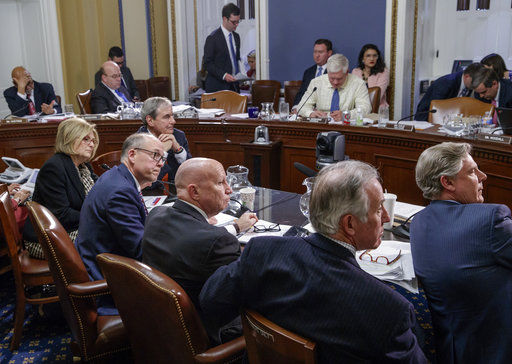Reps to vote on healthcare Thursday

From left, House Budget Committee Chair Diane Black, R-Tenn., House Energy and Commerce Committee Chairman Greg Walden, R-Ore., Rep. John Yarmuth, D-Ky., the Budget Committee ranking member, House Ways and Means Committee Chairman Kevin Brady, R-Texas, Rep. Richard Neal, D-Mass., the ranking member of Ways and Means, and Rep. Frank Pallone, D-N.J., the ranking member of the House Energy and Commerce Committee, gather in the House Rules Committee as the panel shapes the final version of the Republican health care bill before it goes to the floor for debate and a vote, at the Capitol in Washington, Wednesday, March 22, 2017. House Rules Committee Chairman Pete Sessions, R-Texas, sits at top center.
March 23, 2017
DeKALB — The American Health Care Act, the bill proposed to replace the Patient Protection and Affordable Care Act, is scheduled for a vote in the U.S. House of Representatives Thursday.
The Affordable Care Act, also known as Obamacare, was signed into law in 2010 by former President Barack Obama. This government-regulated healthcare requires Americans to purchase health insurance and bans insurance companies from turning people away for any reason, including having a pre-existing condition. Under Obamacare, individuals are allowed to stay on their parents’ insurance until age 26.
The proposed American Health Care Act is still government-regulated but would have changes, including dropping mandates, eliminating subsidies and defunding Planned Parenthood, according to a March 7 Huffington Post article. The act would keep some provisions of Obamacare, such as the ability to be covered by parents’ insurance until age 26 and banning discrimination against people with pre-existing conditions.
It is unclear if the bill will have enough votes in the House to pass, according to a March 22 Politico article. Republicans have majority in the House, and a simple majority, or 218 votes in favor, is needed to pass the bill.
Currently, 137 House Republicans support the replacement, while 52 are undecided and 48 oppose, according to a March 21 New York Times article.
Some moderate Republicans have stated their opposition to the bill because they said members of their districts have benefited from Obamacare and have expressed concerns about its repeal, according to a March 22 Politico article. Meanwhile, House Republican leaders are working on changes to Medicaid and tax credits in an effort to gain more votes, according to a March 21 CNN article.
NIU Republicans President Edward Bowie said he is unsure if the replacement bill will pass because predictions have been wrong before. He said the bill is not perfect, but it’s a good first step.
“Among other things, we will stop fining people for not being able to afford healthcare, which is essentially what the Obamacare mandate does,” Bowie said.
“Hopefully, this will allow us to take secondary and third steps to increase competition across state lines.”
Bowie said he hopes the veteran healthcare system will be reformed.
NIU Democrats President Jon Madison said he is happy that Republicans are trying to help people but thinks they are still off base. He said the current plan does not live up to President Donald Trump’s campaign promise for insurance for all at a low cost.
“I do not believe it will pass [on Thursday],” Madison said. “I think there’s way too much fighting going on still with the certain aspects of it they cut out and aspects that are still included.”
Madison said even if the bill does pass and is signed into law, he thinks it will still be a temporary system. He thinks healthcare will eventually become a single-payer system, which has been introduced in California, according to a March 18 CNN article.
If the bill passes in the House, it will go to the U.S. Senate for a vote. A simple majority, or 50 votes and a tiebreaker from Vice President Mike Pence, would be needed to pass in the Senate. Six of the 52 Republican senators have announced they oppose the legislation, according to a March 21 The Hill article.
Clarissa Hinshaw is a staff writer. She can be reached at [email protected].






